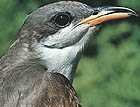Decline of the cuckoo?
Alice Cooke finds cuckoo numbers have fallen by worrying amounts


Winter is over; the weather is slowly improving, the blossoms are out and the cuckoo is sounding its’ distinctive herald to the oncoming summer. Or is it? Not according to the RSPB, who are concerned that our native cuckoo numbers are falling into further decline, which could take it from the Amber List where it currently sits, to the Red List; a register of the UK's most endangered breeding birds.
The theories behind this alarming new nosedive are many, ranging from a decrease in food and water in Southern Africa thanks to ever increasing temperatures, to a decline in ‘host-species’. The cuckoo is renowned for laying its’ eggs in the nests of other birds, prompting them to raise the young on it’s behalf. The species chosen by the cuckoo for this nannying job are widely varied, but over eighty percent of the foster parents are made up of reed warblers, meadow pipits and dunnocks. It may just be an unhappy coincidence, but these three species are also facing a significant decline.
The increased journey that the bird now has to make, thanks to the expanding, already vast Sahara Desert that must be crossed as part of each migration cycle, is another possible explanation. Combined with the shortage of resources in Africa, this is affecting other species such as sedge warblers and sand martins in a similar way.
For generations and indeed centuries, people across Britain have listened for the first cuckoo of the year on a spring day in April. Wordsworth wrote: 'O blithe Newcomer! I have heard,/ I hear thee and rejoice,' O cuckoo! shall I call thee Bird,/ or but a wandering Voice?'
Mike McCarthy, says of the cuckoo in his of newly published book ‘Say Goodbye to the Cuckoo’, ‘what they mean to us, really, is hope. Hope is there in the annual arrival of all of them, small creatures making their giant, incredible journeys and then pouring into our countryside in a singing cascade.’
‘This is more than a loss of species: this is a loss of meaning, on an enormous scale. It is a sign that something is going awry at the heart of things.'
Only between 10,000 and 20,000 breeding pairs of cuckoos currently arrive in the UK each year. It would be an absolute tragedy if we were to lose such a key element of the spring soundscape in our gardens and countryside.
Exquisite houses, the beauty of Nature, and how to get the most from your life, straight to your inbox.
To hear a cuckoo noise, so that you know what to look out for go to the British Library listen to nature archive at: http://www.bl.uk/listentonature/soundstax/birdparrots.html
For more information about cuckoos and how to help go to www.rspb.org.uk
‘Say Goodbye to the Cuckoo’ by Mike McCarthy is published by John Murray General Publishing Division and costs £16.99 from all good bookshops.
Country Life is unlike any other magazine: the only glossy weekly on the newsstand and the only magazine that has been guest-edited by His Majesty The King not once, but twice. It is a celebration of modern rural life and all its diverse joys and pleasures — that was first published in Queen Victoria's Diamond Jubilee year. Our eclectic mixture of witty and informative content — from the most up-to-date property news and commentary and a coveted glimpse inside some of the UK's best houses and gardens, to gardening, the arts and interior design, written by experts in their field — still cannot be found in print or online, anywhere else.
-
 You can now rent King William IV’s former home in London’s Mayfair — for a princely sum
You can now rent King William IV’s former home in London’s Mayfair — for a princely sumThe London property — with royal lineage — is on the market with the estate agency Wetherell for £25,000 a week.
-
 Guy Ritchie: 'My mother married an impoverished aristocrat with a knackered country pile. I've been chasing that dream ever since'
Guy Ritchie: 'My mother married an impoverished aristocrat with a knackered country pile. I've been chasing that dream ever since'The film maker opens up about his love for the countryside, and his friendship with Sir David Beckham.
